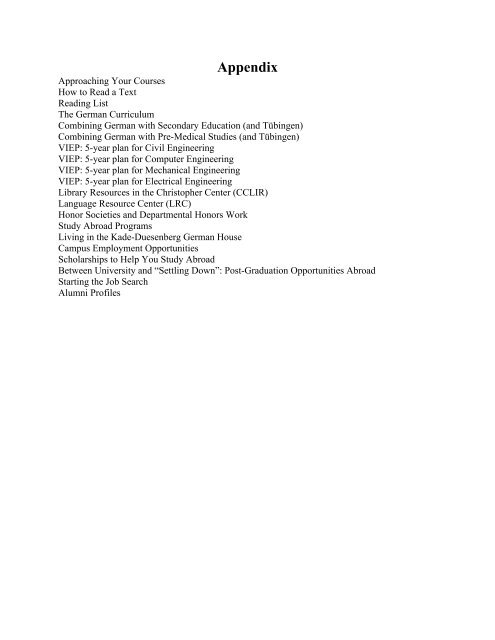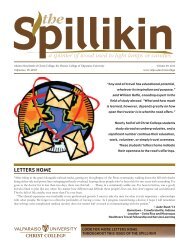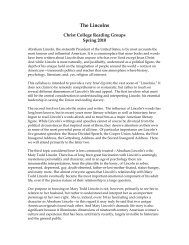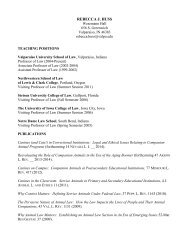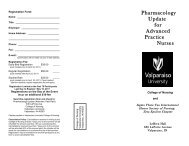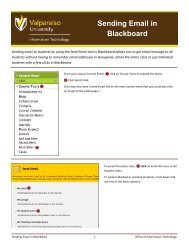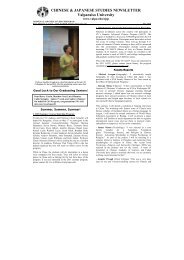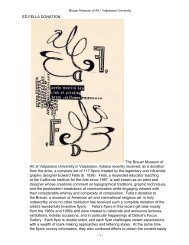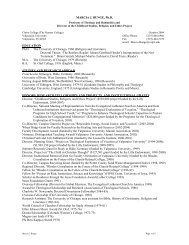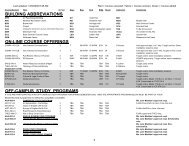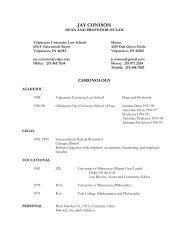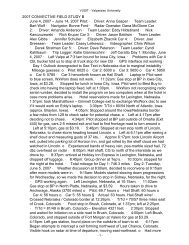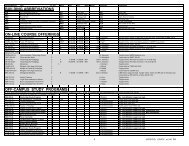German Appendix - Valparaiso University
German Appendix - Valparaiso University
German Appendix - Valparaiso University
You also want an ePaper? Increase the reach of your titles
YUMPU automatically turns print PDFs into web optimized ePapers that Google loves.
<strong>Appendix</strong><br />
Approaching Your Courses<br />
How to Read a Text<br />
Reading List<br />
The <strong>German</strong> Curriculum<br />
Combining <strong>German</strong> with Secondary Education (and Tübingen)<br />
Combining <strong>German</strong> with Pre-Medical Studies (and Tübingen)<br />
VIEP: 5-year plan for Civil Engineering<br />
VIEP: 5-year plan for Computer Engineering<br />
VIEP: 5-year plan for Mechanical Engineering<br />
VIEP: 5-year plan for Electrical Engineering<br />
Library Resources in the Christopher Center (CCLIR)<br />
Language Resource Center (LRC)<br />
Honor Societies and Departmental Honors Work<br />
Study Abroad Programs<br />
Living in the Kade-Duesenberg <strong>German</strong> House<br />
Campus Employment Opportunities<br />
Scholarships to Help You Study Abroad<br />
Between <strong>University</strong> and “Settling Down”: Post-Graduation Opportunities Abroad<br />
Starting the Job Search<br />
Alumni Profiles
Approaching Your Courses<br />
In each of your <strong>German</strong> courses, you will receive a syllabus with information about course<br />
objectives and policies. Read this document carefully and use it throughout the semester. It<br />
explains what to expect and how your work will be evaluated. But there are also general<br />
principles and attitudes that are essential for success in all of your <strong>German</strong> courses at VU:<br />
• Be prepared for class. Eliminate distractions when you do homework, and work in a quiet<br />
place.<br />
• Schedule time to complete homework on a regular basis. Plan to complete two hours of<br />
homework per week for every course credit. (For example, a three-credit course involves<br />
nine hours per week: three in class and six as homework.) Keep this time commitment in<br />
mind as you create your class schedule each semester. At the university level, cutting<br />
corners with time usually means sacrificing learning and grades.<br />
• When you have reading homework, take time to write notes in your text and to think<br />
about the ideas and themes in what you read. Look for more than literal understanding<br />
and surface meanings. You can only succeed at this if you are in the regular habit of<br />
reading in <strong>German</strong>, so establish that habit firmly. See the appendix entry “How to Read a<br />
Text” for further tips.<br />
• Complete all writing assignments thoroughly and on time. Take advantage of the<br />
opportunity to think about grammar rules and practice dictionary skills while you write.<br />
Do not leave it to your professors or classmates to find your mistakes for you.<br />
• Buy and use all required texts. Especially important are required grammar resources and<br />
dictionaries. Of course, in class you will also need a notebook, pen, pencil, calendar, and<br />
folder for course materials.<br />
• Eventually, consider buying a <strong>German</strong>-<strong>German</strong> dictionary. (The top publishers of these<br />
include Duden and Wahrig.)<br />
• Give your full attention in class. Always turn off cell phones and other gadgets before<br />
class and leave them off. Arrive early enough to get set up and begin work when the<br />
scheduled time begins.<br />
• Come to class ready to cooperate with your classmates and professors. Be enthusiastic.<br />
Participate in <strong>German</strong> in all group and partner activities, with a positive attitude and good<br />
work ethic. No matter what your confidence level is, you will learn by doing your best to<br />
communicate in <strong>German</strong>. (This is true whether you are doing most of the talking or most<br />
of the listening.) Remember that practicing communication is key to mastering a<br />
language. Take advantage of opportunities to do this in class.<br />
• Some of the material in your courses will be presented in lecture format. Always come<br />
prepared to take notes, and do so whenever your professor lectures. Keep your notes<br />
organized, and be ready to use them to review.<br />
• Build positive relationships with your classmates and professors. Take the time to get to<br />
know your professors during their scheduled office hours. Whenever you have questions,<br />
concerns, or problems in a course, discuss them first with your professor in an office<br />
hour. Do the same if you are interested in learning more about a given topic. You will<br />
find that your professors are very interested in helping you and building positive working<br />
relationships with you if you make the effort to speak with them outside of class.<br />
• Remember that your courses are only part of your opportunity to learn <strong>German</strong> at VU.<br />
Plan to practice speaking, listening, and reading in other ways too.
How to Read a Text<br />
As a <strong>German</strong> major or minor, you will be doing a lot of reading. Follow these guidelines for<br />
reading success:<br />
1) Find a quiet place to read, away from distractions. A corner in the library is ideal.<br />
2) Set aside enough time to read carefully and thoroughly. If you are rushed, you will inevitably<br />
have trouble understanding the text.<br />
3) Establish a consistent, comfortable reading pace. Don’t make the mistake of stopping the flow<br />
of reading frequently to look up words you do not know. Continuing to read is usually the best<br />
way to figure out what is going on in a text. If you have trouble with a particular paragraph or<br />
section, try reading it a second time, perhaps out loud. If you still don’t understand, now is the<br />
time to look up a key word or two before going on.<br />
4) Read actively. To be able to contribute to class discussion, you will want to mark up your<br />
copy of the text, take notes, and keep track of your questions and ideas about the text.<br />
5) Stop before you are mentally exhausted. If you find you are suddenly reading with your eyes<br />
and not with your head, it’s time to take a break. Try 30 minutes on and 5 minutes off.<br />
Perhaps the idea of writing in a book seems scandalous to you. But good readers always take<br />
ownership of their books and make them truly their own. Where should you write? Everywhere<br />
you find a blank space—use the margins, the end papers, the inside front and back covers. It’s a<br />
little cramped, but highly practical. When you write in your book itself rather than on a separate<br />
piece of paper, you know you’ll always have your notes right with you.<br />
What should you write? Consider these ideas:<br />
• For a non-fictional text, mark the thesis and topic sentences and summarize the argument.<br />
• For a fictional text, make yourself a list of characters, like the Dramatis Personae of a play.<br />
• Track a few elements of the text that you find particularly interesting. This can be a great<br />
way of starting to collect material for potential paper topics. For example, in Kafka’s Die<br />
Verwandlung, you might keep track of Gregor’s humanlike and his buglike characteristics in<br />
a little two-column table. In Heinrich Böll’s Das Brot der frühen Jahre, you might mark all<br />
of the occurrences of the word “Brot” with a star in the margin. In a poem by Goethe, you<br />
could mark in the rhyme scheme.<br />
• Interact with the text, intellectually and emotionally. You might hypothesize what will<br />
happen next, pose ethical questions, or even talk back to the characters.<br />
• Mark words with which you are unfamiliar. You don’t want to look them all up in the middle<br />
of your reading time, but you can go back later and add them to your vocabulary notebook.
Reading List<br />
We hope that at some point, you will want to read some <strong>German</strong> literature of your own<br />
choosing—perhaps on a weekend when you have some free time, during a break or in the<br />
summer, or after you graduate.<br />
How to choose what to read? As always, if you find an author whose work you like, try more of<br />
his or her books. You might even enjoy going back to re-read a book you read for a course.<br />
Sometimes the second time around—whether because it’s later in life or because you feel more<br />
relaxed—is all it takes to discover that you really love a book you weren’t too sure about at first.<br />
Here are some of our suggestions:<br />
MEDIEVAL<br />
Parzival by Wolfram von Eschenbach<br />
Das Nibelungenlied (Anonymous)<br />
Poetry by Hartmann von Aue, Wolfram von Eschenbach, and Walter von der Vogelweide<br />
REFORMATION / HUMANISM<br />
Tischreden by Martin Luther<br />
Der Ackermann aus Böhmen by Johannes von Tepl<br />
Das Narrenschiff by Sebastian Brandt<br />
Plays by Hans Sachs<br />
BAROQUE<br />
Simplicissimus by Grimmelshausen<br />
Absurda Comica oder Herr Peter Squenz by Andreas Gryphius<br />
ENLIGHTENMENT<br />
Nathan der Weise by Gotthold Ephraim Lessing<br />
Emilia Galotti by Gotthold Ephraim Lessing<br />
Minna von Barnhelm by Gotthold Ephraim Lessing<br />
STURM UND DRANG/CLASSICISM<br />
Die Leiden des Jungen Werther by Johann Wolfgang von Goethe<br />
Die Räuber by Friedrich von Schiller<br />
Faust I by Johann Wolfgang von Goethe<br />
Wilhelm Tell by Friedrich von Schiller<br />
Wilhelm Meisters Lehrjahre by Johann Wolfgang von Goethe<br />
Poetry by Friedrich Hölderlin, Johann Wolfgang von Goethe, and Friedrich von Schiller<br />
ROMANTICISM<br />
Heinrich von Ofterdingen by Novalis<br />
Der blonde Eckbert by Ludwig Tieck<br />
Das Erdbeben in Chile by Heinrich von Kleist<br />
Der Sandmann by E.T.A. Hoffmann<br />
Kinder- und Hausmärchen by Jakob and Wilhelm Grimm
MID- 19TH CENTURY<br />
Die Judenbuche by Annette von Droste-Hülshoff<br />
Der arme Spielmann by Franz Grillparzer<br />
Bunte Steine by Adalbert Stifter (Granit, Bergkristall, and the “Vorrede” to the collection)<br />
Woyzeck by Georg Büchner<br />
Poetry by Heinrich Heine<br />
REALISM / NATURALISM / LATE 19TH CENTURY<br />
Maria Magdalena by Friedrich Hebbel<br />
Romeo und Julia auf dem Dorfe by Gottfried Keller<br />
Der Schimmelreiter by Theodor Storm<br />
Effi Briest by Theodor Fontane<br />
Bahnwärter Thiel by Gerhart Hauptmann<br />
Das Gemeindekind by Maria von Ebner Eschenbach<br />
EARLY 20TH CENTURY / MODERNISM<br />
Die Verwandlung by Franz Kafka<br />
Das Urteil by Franz Kafka<br />
Das Schloß by Franz Kafka<br />
Mutter Courage und ihre Kinder by Bertolt Brecht<br />
Die Dreigroschenoper by Bertolt Brecht<br />
Der kaukasische Kreidekreis by Bertolt Brecht<br />
Der Tod in Venedig by Thomas Mann<br />
Der Zauberberg by Thomas Mann<br />
Buddenbrooks by Thomas Mann<br />
Der Steppenwolf by Hermann Hesse<br />
Das siebte Kreuz by Anna Seghers<br />
Poetry by Rainer Maria Rilke, Christian Morgenstern, Stefan George, and Bertolt Brecht<br />
"Todesfuge" by Paul Celan<br />
POST-WAR TO PRESENT<br />
Draußen vor der Tür by Wolfgang Borchert<br />
Biedermann und die Brandstifter by Max Frisch<br />
Homo faber by Max Frisch<br />
Der Besuch der alten Dame by Friedrich Dürrenmatt<br />
Der Richter und sein Henker by Friedrich Dürrenmatt<br />
Katz und Maus by Günter Grass<br />
Die Blechtrommel by Günter Grass<br />
Und sagte kein einziges Wort by Heinrich Böll<br />
Der geteilte Himmel by Christa Wolf<br />
Nachgetragene Liebe by Peter Härtling<br />
Jakob der Lügner by Jurek Becker<br />
Bronsteins Kinder by Jurek Becker<br />
Frost by Thomas Bernhard<br />
Sansibar oder der letzte Grund by Alfred Andersch<br />
Poetry by Nelly Sachs, Hans Magnus Enzensberger, Wolf Biermann, and Ernst Jandl
The <strong>German</strong> Curriculum<br />
Four Year Plan for the <strong>German</strong> major who places into FLGR 204:<br />
Fall Semester Spring Semester<br />
First year 204 220<br />
Second year (351 or 353)<br />
(305 or 306)<br />
Third year (Tübingen!) <strong>German</strong> electives<br />
Fourth year 493<br />
(351 or 353)<br />
(305 or 306)<br />
271<br />
(341 or 352)<br />
271<br />
390<br />
(341 or 352)<br />
271<br />
390<br />
Four Year Plan for the <strong>German</strong> major who places into FLGR 203:<br />
Fall Semester Spring Semester<br />
First year 203 204<br />
Second year (305 or 306) 220<br />
271<br />
Third year (Tübingen!) <strong>German</strong> electives (including any course substitution for a<br />
Fourth year (351 or 353)<br />
493<br />
course in the 351, 352, 353 series).<br />
• Courses in bold-face type are required for the <strong>German</strong> major.<br />
(341 or 352)<br />
271<br />
390<br />
• If two courses are listed in parentheses like this: (341 or 352) it means that one of the two<br />
courses will be offered in that particular semester. If 341 is offered in the spring of your<br />
sophomore year, you can be sure that 352 will be offered in the spring of your senior year. But<br />
they will not both be offered in both semesters.<br />
• We know that you also need to take general education courses, courses for your minor, and<br />
other elective courses; please meet with your <strong>German</strong> advisor to make a four-year plan that<br />
includes them along with study abroad.<br />
FLGR 220: Approaches to <strong>German</strong> Studies. 3 cr.<br />
An introduction to the strategies of reading, interpreting, and writing about <strong>German</strong> texts.<br />
Reading and discussion of works from a variety of genres with particular attention to textual<br />
analysis. Prerequisite: FLGR 204.<br />
FLGR 271: <strong>German</strong> Drama Practicum. 1 - 3 cr. (normally 1 cr.)<br />
Rehearsal and performance of a play or an except from a play in <strong>German</strong>. No prior acting<br />
experience required. Prerequisite: FLGR 204. May be used to fulfill the Humanities: Fine and<br />
Performing Arts component of the General Education Requirements. May be repeated.
FLGR 305: <strong>German</strong> in the Professions. 4 cr.<br />
A study of <strong>German</strong> language as used in the world of business and technology, including basic<br />
commercial and technical vocabulary, workplace correspondence, and professional presentation.<br />
Advanced communication skills are developed. Prerequisite: FLGR 204.<br />
FLGR 306: <strong>German</strong> in the Media. 4 cr.<br />
A study of <strong>German</strong> language and contemporary society through the media, including<br />
newspapers, magazines, radio, television, film, and the internet. Advanced communication skills<br />
are developed. Prerequisite: FLGR 204.<br />
FLGR 341: History of the <strong>German</strong> Language. 3 cr.<br />
A historical study of the development of the <strong>German</strong> language. Students are introduced to the<br />
basics of linguistics, to linguistic change from Indo-European to the present, and to<br />
contemporary dialect variation in <strong>German</strong>. Prerequisite: FLGR 220.<br />
FLGR 351: <strong>German</strong> Studies: The Middle Ages and Humanism. 3 cr.<br />
A study of <strong>German</strong>-language literature and culture from the emergence of the Holy Roman<br />
Empire of the <strong>German</strong> Nation to Luther and the early modern era. Intellectual and aesthetic<br />
works (e.g. architecture, art, drama, music, philosophy, poetry, prose fiction) are examined in<br />
cultural-historical context. Prerequisite: FLGR 220.<br />
FLGR 352: <strong>German</strong> Studies: Enlightenment and Revolution. 3 cr.<br />
A study of <strong>German</strong>-language literature and culture from the beginnings of the modern era to the<br />
failed revolution of 1848. Intellectual and aesthetic works (e.g. architecture, art, drama, music,<br />
philosophy, poetry, prose fiction) are examined in cultural-historical context. Prerequisite:<br />
FLGR 220.<br />
FLGR 353: <strong>German</strong> Studies: Constructing a Modern Nation. 3 cr.<br />
A study of <strong>German</strong>-language literature and culture from the emergence of the first unified<br />
<strong>German</strong> nation-state in the nineteenth century to the present. Intellectual and aesthetic works<br />
(e.g. architecture, art, drama, music, philosophy, poetry, prose fiction) are examined in culturalhistorical<br />
context. Prerequisite: FLGR 220.<br />
FLGR 390: Seminar in <strong>German</strong>. 3 cr.<br />
A study of selected themes or issues in <strong>German</strong> literature, language, or civilization. May be<br />
repeated for credit if the topic varies. Prerequisite: one course from the following: FLGR 351,<br />
352, or 353.<br />
<br />
FLGR 493: Senior Seminar. 3 cr.<br />
A senior-level capstone course which integrates knowledge and skills from previous <strong>German</strong><br />
courses. Language skills (speaking, listening, writing, reading) are refined as depth and nuance<br />
are added to the understanding of <strong>German</strong> history, literature, culture and contemporary events.<br />
Prerequisites: senior standing and consent of the Chair of the Department.
Combining <strong>German</strong> with Secondary Education (and Tübingen)<br />
Fall Semester Spring Semester<br />
First year Core 5<br />
ED 203 3<br />
PE 100 1<br />
Quan. Anal. 3 - 4<br />
<strong>German</strong> 204 4<br />
TOTAL = 16 - 17 cr.<br />
Second year ED Block 1 (CP 1) 6<br />
Theology 200 3<br />
<strong>German</strong> (351 or 353) 3<br />
<strong>German</strong> (305 or 306) 4<br />
TOTAL = 16 cr.<br />
Core 5<br />
Psych 110/111 4<br />
Comm 243 3<br />
Natural Science 3 - 4<br />
<strong>German</strong> 220 3<br />
TOTAL = 18 - 19 cr.<br />
ED Block 2 8<br />
ED Media Block 6<br />
<strong>German</strong> (341 or 352) 3<br />
TOTAL = 17 cr.<br />
Third year (Tübingen!) Two Social Science courses 6<br />
Upper-level Theology course 3<br />
Two Humanities courses 6<br />
<strong>German</strong> electives 6<br />
(minimum of two; must include substitute for 352 if not<br />
taken sophomore year)<br />
Additional electives 3 - 18<br />
(minimum of one)<br />
TOTAL FOR YEAR = 24 - 39 cr.<br />
Fourth year ED Block 3 (CP 2) 9<br />
<strong>German</strong> 493 3<br />
<strong>German</strong> (351 or 353) 3<br />
TOTAL = 15 cr.<br />
ED Block 4 (CP 3) 14<br />
TOTAL = 14 cr.
Combining <strong>German</strong> with Pre-Medical Studies (and Tübingen*)<br />
Most pre-med students major in Biology or Chemistry. It is easy to combine a major in <strong>German</strong><br />
with either of these majors, but it is difficult to add the junior year in Tübingen. The reason is<br />
simple: most students take the MCAT (Medical College Admission Test) in the spring of the<br />
junior year (the Tübingen year).<br />
But if you are eager to . . .<br />
• prepare for medical school and<br />
• study abroad in Tübingen for the whole junior year<br />
. . . then here are some possibilities to consider:<br />
1. Medical schools do not require that you major in Biology or Chemistry. But to do well on the<br />
MCAT exams you must take these courses:<br />
Biology 171 and 172 (Diversity of Life; 4 cr. each)<br />
Chemistry 121 and 122 (General Chemistry; 4 cr. each)<br />
Chemistry 221 and 222 (Organic Chemistry; 4 cr. each)<br />
Physics 111 and 112 (Essentials of Physics; 4 cr. each)<br />
(or 141 and 142 if you are strong in Physics)<br />
Math 124 (Finite Math; 4 cr.)<br />
(or Math 131 if you are strong in Math)<br />
(NOTE: "general wisdom" suggests that you should have a B grade or higher in Chemistry 221<br />
and 222 to be accepted into a medical school.)<br />
2. The MCAT is administered internationally. In 2009 the MCAT was administered in April<br />
and June (and August) in <strong>German</strong>y and France. If you are able to take the courses listed above<br />
during the freshman and sophomore years, you could take the MCAT while in Tübingen.<br />
Remember that you could take key science textbooks with you to review for the test while in<br />
<strong>German</strong>y.<br />
3. Then to enhance your preparation for medical school you could add Chemistry 315<br />
(Biochemistry), Biology 270 (Genetics), and Biology 380 (Human Physiology) in the senior<br />
year.<br />
Another option is to go to Tübingen, delay the MCAT until the spring of your senior year, and<br />
then take one year off after graduation before going to medical school.<br />
IF you have spent junior year in Tübingen we can most likely arrange a post-graduation,<br />
year-long internship in a Tübingen clinic for that in-between year -- yes, we have contacts!<br />
* Study in Reutlingen is for one semester only and may be an option for you. Remember,<br />
though, that the Reutlingen program is conducted in English and is normally not the best choice<br />
for advanced students of <strong>German</strong>.
Library Resources in the Christopher Center (CCLIR)<br />
1. Books<br />
If you’re looking for a book, use the Galileo catalog on the library website or browse the relevant<br />
sections in the library. There are several places to look for <strong>German</strong>-related books:<br />
1) The DDs—<strong>German</strong> history (3rd floor)<br />
2) The PTs—<strong>German</strong> literature (4th floor)<br />
3) The PNs—Language (4th floor)<br />
4) The Ns—Art history (4th floor)<br />
5) The MLs—Music history (4th floor)<br />
See also the reference section, under the same call numbers as above (1st floor)<br />
Here are a few titles you might start with:<br />
Brockhaus, Deutsche Geschichte in Schlaglichtern. Ed. Helmut Müller.<br />
Leipzig: Brockhaus, 2007.<br />
DD89 .B76 2007<br />
Encyclopedia of Contemporary <strong>German</strong> Culture. Ed. John Sandford.<br />
London: Routledge, 1999.<br />
DD290.26 .E53 (Reference)<br />
Metzler Literatur Lexikon: Begriffe und Definitionen. Ed. Günter and Irmgard Schweikle<br />
Stuttgart: Metzler, 1990.<br />
PN41 .M43 1990<br />
The Oxford Companion to <strong>German</strong> Literature. Henry and Mary Garland.<br />
Oxford: Oxford UP, 1997.<br />
PT41 .G3 1997<br />
The Concise Oxford Dictionary of Literary Terms. Chris Baldick.<br />
Oxford: Oxford UP, 1990.<br />
PN41 .C67 1990<br />
2. Articles<br />
If you’re looking for an article on a literary topic, use the Modern Language Association (MLA)<br />
database, available through the library homepage.<br />
We have several of the top journals in print at the CCLIR:<br />
<strong>German</strong> Quarterly<br />
<strong>German</strong>ic Review<br />
Monatshefte<br />
Many other articles are available electronically or through Interlibrary Loan.
Language Resource Center (LRC)<br />
The Language Resource Center is located in Meier Hall 144 and 145. The LRC provides services<br />
and resources for <strong>German</strong> students of all levels, including:<br />
• a computer lab where, in addition to all the standard computing features, you can use <strong>German</strong><br />
spell- and grammar-check, record audio samples, play <strong>German</strong> CD-ROMs, or listen to<br />
<strong>German</strong> music CDs<br />
• a film lending library with a wide variety of <strong>German</strong> DVDs that can be checked out<br />
overnight or watched in the LRC<br />
• a small library of dictionaries, textbooks, and other books in <strong>German</strong><br />
• a study lounge where you can study, hang out, read The Economist or FOCUS magazine,<br />
play <strong>German</strong> games, read <strong>German</strong> books, or watch satellite TV from <strong>German</strong>y<br />
(Channel 84: ProSieben, Channel 85: Deutsche Welle)<br />
• free tutoring<br />
• the Language Cafe, where you can enjoy a fresh-brewed cup of coffee and support microlending<br />
in the developing world at the same time<br />
For a list of the films available and a link to the satellite TV schedule, visit the LRC website:<br />
http://www.valpo.edu/foreignlanguages/lrc/index.php<br />
Classic Film Suggestions:<br />
The Cabinet of Dr. Caligari (1919)<br />
Nosferatu (1922)<br />
The Blue Angel (1930)<br />
M (1931)<br />
The Murderers are Among Us (1946)<br />
Modern Film Suggestions:<br />
Ali: Fear Eats the Soul (1971)<br />
Jacob the Liar (1974)<br />
Effi Briest (1974)<br />
The Lost Honor of Katharina Blum (1975)<br />
The Tin Drum (1979)<br />
Nosferatu, Phantom der Nacht (1979)<br />
Das Boot (1981)<br />
Wings of Desire (1987)<br />
The Promise (1995)<br />
Run Lola Run (1999)<br />
Dog Days (2001)<br />
Mostly Martha (2002)<br />
Nowhere in Africa (2002)<br />
Good-bye, Lenin! (2003)<br />
Free Radicals (2003)<br />
Downfall (2005)<br />
Schultze Gets the Blues (2005)<br />
The Lives of Others (2007)
Honorary Societies and Departmental Honors Work <br />
<br />
Delta Phi Alpha (www.deltaphialpha.org)<br />
Founded in 1927, Delta Phi Alpha is the national <strong>German</strong> Honorary Society. Chapters are<br />
located at 236 universities and colleges throughout the country.<br />
The Honor Society "seeks to recognize excellence in the study of <strong>German</strong> and to provide an<br />
incentive for higher scholarship. The Society aims to promote the study of the <strong>German</strong> language,<br />
literature and civilization and endeavors to emphasize those aspects of <strong>German</strong> life and culture<br />
which are of universal value and which contribute to man's eternal search for peace and truth."<br />
If your overall GPA and <strong>German</strong> GPA are high enough and if you have taken an appropriate<br />
array of courses in <strong>German</strong>, you will be invited to join the Valpo chapter of Delta Phi Alpha. As<br />
a member you are eligible to apply for a Delta Phi Alpha Scholarship and will be awarded an<br />
honor cord to wear at graduation.<br />
The two study abroad scholarships supported by national Delta Phi Alpha are described under<br />
"Scholarships to Help You Study Abroad."<br />
Departmental Honors<br />
If you have completed all or virtually all courses in the <strong>German</strong> program and yearn to tackle a<br />
research project that deepens your understanding of a topic in <strong>German</strong> you may wish to apply for<br />
departmental Honors Work. The process for applying for Honors Work is described in the<br />
university catalog. Your project proposal must be prepared by early April of the junior year, and<br />
you must then register each semester of the senior year for 3 credits of Honors Work and (at<br />
most) 12 additional credits of regular classes. If you are interested in Honors Work in <strong>German</strong><br />
you should begin discussing your ideas for a project with one (or more) of the <strong>German</strong> professors<br />
early in the junior year.<br />
Phi Beta Kappa (www.pbk.org)<br />
The oldest (founded in 1776) and most prestigious of honorary societies, Phi Beta Kappa<br />
initiates students in the liberal arts and sciences who have excelled in both the humanities<br />
(including foreign language study at advanced levels) and the sciences (including mathematics).<br />
<strong>German</strong> majors who maintain an extremely high grade point average and enroll in rigorous<br />
courses in mathematics and the sciences have a good chance to be selected for membership.
Study Abroad Programs<br />
There are three options for study abroad in <strong>German</strong>y: one year in Tübingen, one semester in<br />
Reutlingen, or Rottenburg am Neckar<br />
Tübingen<br />
For serious students of <strong>German</strong>, Tübingen is the clear choice. Students spend an entire academic<br />
year in <strong>German</strong>y, studying as regular full-time students at the Eberhard-Karls-Universität.<br />
The requirements to study in Tübingen are the following:<br />
• You must have completed at least <strong>German</strong> 204, but most successful applicants have<br />
completed higher-level courses.<br />
• You must be a junior. A GPA of 3.0 is required.<br />
• You must be approved by the <strong>German</strong> section and by International Programs.<br />
There are three components of study:<br />
1) Language and Orientation Program (September - mid- October): A program sponsored by<br />
Tübingen <strong>University</strong>. The program prepares you for life at a <strong>German</strong> university. Completion<br />
of this program allows you to earn three elective credits towards a <strong>German</strong> major or minor.<br />
2) Wintersemester (mid-October – mid-February): Register for courses sponsored by the<br />
foreign student office (Internationale Sprachprogramme) and/or for regular lectures and<br />
seminars at the university. Select your courses based on your major, minor or general<br />
education requirements at VU and plan carefully with your advisor ahead of time.<br />
3) Sommersemester (mid-April – mid-July): As in the Wintersemester.<br />
Reutlingen<br />
The Reutlingen program is available for students unable to dedicate a year to study in <strong>German</strong>y.<br />
Twenty VU students take courses on the campus of the Hochschule Reutlingen taught by the VU<br />
resident director and <strong>German</strong> professors.<br />
Requirements to study in Reutlingen are:<br />
• No previous study of <strong>German</strong> is required (repeat <strong>German</strong> 204 for 4 <strong>German</strong> elective credits).<br />
• You must be a sophomore, junior, or senior. A GPA of 3.0 is generally required.<br />
Courses include: 1) <strong>German</strong> 204, 2) <strong>German</strong> Life and Culture, 3) Art 311, 4) Economics 290, 5)<br />
a course in the VU director’s academic area. Except for 204, courses are taught in English.<br />
Rottenburg am Neckar<br />
Students with a double major in <strong>German</strong> and music (organ) can study in the spring of the junior<br />
year at our partner in Rottenburg am Neckar (Hochschule für Kirchenmusik). Your semester<br />
will be filled with singing, organ lessons, and music!<br />
Note: You should consult with one of the <strong>German</strong> professors as early as possible about your<br />
study abroad plans. Freshman year is not too early to begin thinking about studying in <strong>German</strong>y.<br />
Every year there are information meetings on both the Tübingen and Reutlingen programs. For<br />
more information, visit the study abroad website (http://www.valpo.edu/studyabroad/) or<br />
International Programs, upstairs in the Harre Union.
Living in the Kade-Duesenberg <strong>German</strong> House<br />
The Basics:<br />
Valpo sophomore, junior, and senior students may live in the Kade-Duesenberg <strong>German</strong> House<br />
and Cultural Center. <strong>German</strong> majors and minors who are serious about their goal to achieve<br />
fluency in <strong>German</strong> should consider living in the <strong>German</strong> House during the sophomore and senior<br />
years with the junior year devoted to study abroad.<br />
Apply in January for the following academic year; you will be informed of your selection status<br />
in February before the regular room selection process begins.<br />
The Process<br />
1. As soon as possible take a tour of the residential section of the Kade-Duesenberg <strong>German</strong><br />
House and Cultural Center (the second floor). Valpo's <strong>German</strong> Club meets there so you'll have a<br />
chance to see what the rooms, suites, and common areas look like.<br />
2. Come to the annual information meeting in December; you'll hear about this meeting in your<br />
<strong>German</strong> class. If you still haven't toured the <strong>German</strong> House this will be a chance.<br />
3. Complete the application form in January. It has three main sections: a basic facts and figures<br />
section, an essay that explains why you wish to live in the <strong>German</strong> House, and your grade<br />
transcript. The essay is written in English because the selection committee includes faculty<br />
and/or staff who do not speak <strong>German</strong>.<br />
4. Have your current RA fill out the recommendation form. The selection committee wants to<br />
know how well you contribute to good community living at Valpo.<br />
Frequently Asked Questions<br />
Who can live in the Kade-Duesenberg <strong>German</strong> House and Cultural Center?<br />
Any Valpo sophomore, junior or senior who has taken <strong>German</strong> 204 or the equivalent can live in<br />
the <strong>German</strong> House. Applications are submitted in the January before the academic year in<br />
question.<br />
How long can I live in the <strong>German</strong> House?<br />
Students who wish to live in the <strong>German</strong> House a second or third year simply reapply.<br />
I'll be abroad for part of the year. Can I apply for just one semester?<br />
Yes. Students who are studying abroad are especially encouraged to apply to live in the <strong>German</strong><br />
House -- either in preparation for their time abroad or as a way of easing back into American<br />
campus life. There is space on the application form for you to indicate your intent to apply for<br />
the fall or the spring semester only<br />
What happens if I apply to live in the <strong>German</strong> House but am not selected?<br />
Space in the <strong>German</strong> House is limited to 13 students, one of whom is the RA; this means that not<br />
every applicant can always be accommodated. Applications are reviewed by a committee of<br />
faculty and staff and selections are made based on language ability and willingness to participate
in community life. Seniority and gender balance may also be considered. Applicants are<br />
informed whether or not they have been selected well in advance of the campus-wide room<br />
selection process so that students who are not selected to live in the <strong>German</strong> House have time to<br />
find a roommate and join the regular room selection process at no disadvantage.<br />
Who is the Resident Assistant?<br />
Each year there is a new resident assistant. The RA is normally an exchange student from<br />
Tübingen who takes regular VU courses while serving also as RA at the <strong>German</strong> House.<br />
What are the rooms like?<br />
The rooms in the <strong>German</strong> House are singles and doubles within same-gender suites. Each suite<br />
has its own bathroom so that only two, three, or four students share a bathroom. Each suite has<br />
moveable furniture -- beds that can be bunked, wardrobes, dressers, desks and study chairs;<br />
telephones with voicemail services provided by the university; wiring for cable television; wiring<br />
for computer connections-one port per person; and access to the balconies that run the length of<br />
the house.<br />
What are the shared areas of the <strong>German</strong> House like?<br />
The shared areas of the <strong>German</strong> House include a great room with fireplace, comfortable seating,<br />
and a large table for communal meals; a large kitchen; a TV lounge with <strong>German</strong> (and<br />
American) cable television; a study room with university computers and a printer; a laundry<br />
room; and a guest restroom. For students who have cars on campus there is a small parking lot<br />
available in front of the house.<br />
What makes the <strong>German</strong> House different from the other residence halls?<br />
There are two main differences. First, <strong>German</strong> House residents pledge to speak only <strong>German</strong> in<br />
the public areas of the house. Second, residents share meal planning and preparation on weekday<br />
evenings, Sunday through Thursday. This shared mealtime (and planning time for it) is the main<br />
time period for community interaction in <strong>German</strong>.<br />
Are there any work-study jobs associated with living in the <strong>German</strong> House?<br />
Yes. <strong>German</strong> House residents may apply for work-study positions as student building managers<br />
in the Cultural Center downstairs and as teachers in the "Kinder lernen Deutsch" program. Other<br />
<strong>German</strong>-related jobs on campus include student aides for faculty members and Language<br />
Resource Center aides / tutors.<br />
What does it cost to live in the <strong>German</strong> House?<br />
In the 2010/2011 academic year the charge is $3,110 per semester for a double room and $4,665<br />
per semester for a single room.<br />
Do I have to purchase a full-price meal card? After all, we are doing our own cooking four<br />
nights each week.<br />
No, your meal card buy-in is at a lower rate. In the 2009/2010 academic year the charge was<br />
$320 per semester for sophomores and juniors; seniors are not required to purchase a meal card.<br />
See www.valpo.edu/germanhouse for more information.
Campus Employment Opportunities<br />
Student Building Managers<br />
Every year three or four students who live in the <strong>German</strong> House are employed as student<br />
building managers. These students are responsible for opening the Cultural Center (the<br />
downstairs, non-residential part of the <strong>German</strong> House) in the morning, being sure that the<br />
classrooms are ready for use, moving classroom furniture as needed, assisting in clerical tasks,<br />
preparing for Kaffeestunde and other events, staffing the reception desk, and closing at roughly<br />
5:00 pm.<br />
The positions normally each fill 8 - 10 hours per week at an hourly wage slightly over minimum<br />
wage. Schedules are set around your class responsibilities.<br />
Language Resource Center: Student Aide / Tutor<br />
The director of the Language Resource Center employs one <strong>German</strong> student each year to assist<br />
in staffing the LRC and to provide tutoring for beginning <strong>German</strong> students (as needed). The<br />
director normally asks the <strong>German</strong> faculty for recommendations and hopes to find someone who<br />
is potentially a good tutor and also has some computer skills.<br />
Student Aide to a <strong>German</strong> Professor<br />
Each <strong>German</strong> professor may request the assistance of a student for about 2 - 4 hours per week.<br />
That assistance might involve library research, grading assistance, or other clerical tasks.<br />
Teaching<br />
There are two teaching opportunities for <strong>German</strong> students, both of which involve late Monday<br />
afternoons with elementary-school children. The teaching is not about conjugating verbs or<br />
learning plurals, but about fun and games in <strong>German</strong>. Teachers in both programs are expected to<br />
participate in a Sunday afternoon workshop at the beginning of September. There are always at<br />
least two teachers (you) in each class.<br />
<br />
Kinder lernen Deutsch<br />
Children from 1st to 3rd grade participate in this program that meets at the Kade-Duesenberg<br />
<strong>German</strong> House and Cultural Center. Your hourly wage is slightly over minimum wage.<br />
First-graders are in one class; 2nd and 3rd-graders are in another.<br />
Bridges to World Languages<br />
Children in the 4th and 5th grades participate in this program that meets at one or more of the<br />
elementary schools in the <strong>Valparaiso</strong> Community Schools district. You are officially an<br />
employee of the VCS district. You and your teaching partner must drive to the school where<br />
you teach. French and Spanish students teach in this program too.<br />
Scholarships to Help You Study Abroad<br />
<br />
Delta Phi Alpha (http://www.deltaphialpha.org/seniorscholarship.htm)<br />
One senior <strong>German</strong> major nationwide is selected to receive the senior scholarship for research<br />
and study abroad in a <strong>German</strong>-speaking country. This student will be recognized by Delta Phi<br />
Alpha with a cash prize of $2500. The graduating senior must agree to apply for the DAAD grant<br />
if named the recipient of the prize and intend to proceed directly to graduate work upon returning<br />
to the U.S. Deadline: normally in late October.<br />
A sophomore or junior is selected to receive a prize of $1500 to help defray costs of study<br />
abroad in a <strong>German</strong>-speaking country. Applicants, who must be members of Delta Phi Alpha,<br />
should present a plan for study abroad with the application. Deadline: normally in late October.<br />
RISE (www.daad.de/rise/en)<br />
If you are majoring in biology, chemistry, physics, earth sciences, or engineering (along with<br />
your <strong>German</strong> studies) you may apply for a summer internship working as an assistant for an<br />
advanced doctoral student in <strong>German</strong>y.<br />
The internship is supported so that you will have health insurance and living expenses covered<br />
while in <strong>German</strong>y. You will have to pay for airfare to <strong>German</strong>y.<br />
Applications are normally due in January for the following summer.<br />
DAAD Undergraduate Scholarships (http://www.daad.org/?p=47220)<br />
Highly qualified sophomores or juniors seeking to fund a 4 - 10 month stay in <strong>German</strong>y should<br />
consider applying for a DAAD scholarship. Sophomores planning to study in Tübingen or<br />
juniors in VIEP-<strong>German</strong> are good candidates for this scholarship. The application process is<br />
complicated, so begin work well before the late January deadline.<br />
Baden-Württemberg Landesstipendium<br />
The <strong>German</strong> state of Baden-Württemberg annually awards scholarships to American students<br />
who will be studying in that state; Valpo students headed to Tübingen should apply. Typically<br />
the award includes an invitation to live in a special dormitory (Prinz Karl) along with a generous<br />
monthly stipend (normally for five months only).<br />
Valpo's Director of Study Abroad Programs must nominate you for this scholarship, so be in<br />
touch with the director if you plan to study in Tübingen. The deadline is in the late winter.<br />
Henry and June Giebel Study Abroad Scholarships<br />
(http://www.valpo.edu/germanhouse/scholarships/giebelscholarships.php)<br />
If you are accepted to study in Tübingen, in Rottenburg am Neckar, or as a VIEP-<strong>German</strong><br />
student in Reutlingen, you will automatically be considered for a Henry and June Giebel Study<br />
Abroad Scholarship. The award can vary from year to year, but will roughly cover your housing<br />
expenses (not food) while you are in <strong>German</strong>y.<br />
Between <strong>University</strong> and "Settling Down": Post-Graduation<br />
Opportunities Abroad <br />
If you hope to return to Europe and aren't ready to start applying for permanent positions,<br />
consider applying for a research or work year.<br />
Prof. Schaefer (History) coordinates Valpo's annual applications for three major programs of<br />
interest for students of <strong>German</strong>. If you are interested in any of these three opportunities you<br />
should speak with Prof. Schaefer (and with your <strong>German</strong> professors) late in the junior year or<br />
immediately upon returning to campus in the senior year. The two opportunities in <strong>German</strong>y<br />
have a very early fall deadline.<br />
1. Fulbright Research Fellowships (Fulbright Full Grants):<br />
For exceptional students who wish to conduct independent research at a <strong>German</strong> university (10<br />
months beginning in September after graduation). The application is complex and requires that<br />
you describe your research project and prepare a personal statement. The application process<br />
also involves an on-campus interview and ranking procedure before the application is sent by<br />
Prof. Schaefer to the Fulbright Commission. This fellowship is particularly appropriate for<br />
students who are considering graduate work in <strong>German</strong> (or in a <strong>German</strong>-related field like<br />
history).<br />
http://us.fulbrightonline.org/program_country.html?id=41#full<br />
2. English Teaching Assistantships in <strong>German</strong>y<br />
In cooperation with the Pädagogischer Austauschdienst (PAD) and the 16 <strong>German</strong> states<br />
Fulbright also sponsors Teaching Assistantships. Grantees are placed as teaching assistants in<br />
English classes at all types of <strong>German</strong> schools; your assignment is simply to help English<br />
teachers in the classroom (September - late June).<br />
http://us.fulbrightonline.org/program_country.html?id=41#pad<br />
3. . . . or in Austria (English Language Teaching Assistantship Program)<br />
This program is similar to the one in <strong>German</strong>y. But the deadline is not until February of your<br />
senior year, so you have a chance to make a decision about whether to apply much later.<br />
http://www.fulbright.at/us_citizens/teaching_intro.php<br />
Cooperative Education Positions in Aalen or Reutlingen<br />
For some 20 years Valpo students or recent graduates have taken one-year cooperative-education<br />
positions in the respective Offices of International Programs at the universities in Aalen and<br />
Reutlingen. The position is clerical in nature, but also involves considerable interaction with<br />
students from all over the world who are studying in Aalen or Reutlingen. A two-page<br />
description of each position is available from Prof. DeMaris; you should speak with her if you<br />
would like to be considered for one of these positions.
Starting the Job Search<br />
<br />
Career Center<br />
The most important thing you can do is to take advantage of the services provided by the Career<br />
Center (in the Harre Union). There you can get assistance:<br />
Composing resumes and cover letters<br />
Preparing personal statements<br />
Strategizing about the job search<br />
Attending workshops and other programs<br />
Getting career counseling<br />
Learning about open positions<br />
Don't be discouraged if employers who come to campus seem only to be looking for nursing,<br />
accounting, or engineering majors. Arranging interviews is only one aspect of the services that<br />
the Career Center provides.<br />
Library Assistance<br />
Directory of Foreign Firms Operating in the United States. 10th edition, 2000.<br />
Reference Room of the CCLIR: HG 4057 .A155 2000<br />
(This same reference work updated to 2006 is available online; you must go to the Law School<br />
Library to access it, though.)<br />
Directory of American Firms Operating in Foreign Countries. 15th edition, 1999.<br />
Reference Room of the CCLIR: HG 4538.A1 D5<br />
Use these two volumes to help you think beyond the obvious <strong>German</strong> companies that operate in<br />
the United States. Did you know that there are over 90 <strong>German</strong> companies that operate just in<br />
Indiana? Go to: to download a "Foreign<br />
Investment Map" (667 pdf, KB) to see all the locations of <strong>German</strong> companies in Indiana. As you<br />
plan your courses at Valpo think about what skills you might develop that might make a good<br />
speaker of <strong>German</strong> (like you!) even more attractive to a <strong>German</strong> company.<br />
Job Club<br />
The <strong>German</strong> Program periodically (normally annually) hosts an evening called "Job Club." A<br />
Valpo <strong>German</strong>-major alumna or alumnus visits campus and talks with current students about<br />
her/his career and how <strong>German</strong> helped to make that career possible. Job Club is a casual evening<br />
event with opportunity to interact with the alum.<br />
Alumni Profiles<br />
Graduates of VU's <strong>German</strong> program have gone on to use their <strong>German</strong> skills in many ways in the<br />
workplace and beyond. To read the full profiles and see photos of the graduates, go to<br />
http://www.valpo.edu/foreignlanguages/german/profiles.php.<br />
Marie Geishecker earned a B.A. in <strong>German</strong> and International Economics & Cultural Affairs in<br />
May 2005. She completed a post-graduate cooperative-education placement in Aalen, <strong>German</strong>y<br />
one year later and now serves as a Legal Assistant at Thiedmann & Edler in downtown Chicago<br />
where she is called to use <strong>German</strong> daily.<br />
" When I was growing up I was blessed with just a few years with my great grandmother. She<br />
was raised in a <strong>German</strong> orphanage and taught me little things to say in the only language she<br />
used when she was a child..."<br />
John Hasler earned his B.A. in International Economics and Cultural Affairs and <strong>German</strong> at<br />
<strong>Valparaiso</strong> <strong>University</strong> in 2001. He earned a Fulbright Research Scholarship to study at the<br />
Universität Rostock, <strong>German</strong>y in 2001 and a Masters of European Studies at the Universität<br />
Bonn, <strong>German</strong>y in 2003. He currently is on staff at National Community Church in Washington,<br />
DC, working in discipleship, urban outreach and global development.<br />
" I’ll never forget that fall day in 1996, as I sat in the VUCA auditorium, listening to Dr. Duvick<br />
explain the philosophy behind the IECA program during my very first visit to the Valpo<br />
Campus. I remember leaving that seminar knowing that this would be the program to which I<br />
would aspire, not to mention sign up for that junior year in Tübingen, <strong>German</strong>y..."<br />
Peter Krenzke earned his B.S. in Mechanical Engineering in 2008 with a major in <strong>German</strong> in<br />
Valpo’s International Engineering Program in <strong>German</strong> (VIEP-<strong>German</strong>). He is currently an<br />
Associate Engineer at Caterpillar, Inc.<br />
" Studying <strong>German</strong> has opened up numerous opportunities for me. As a mechanical engineering<br />
major in the <strong>Valparaiso</strong> <strong>University</strong> International Engineering Program in <strong>German</strong> (VIEP-<br />
<strong>German</strong>) I had the opportunity to spend a year studying, traveling, and working in <strong>German</strong>y... "


